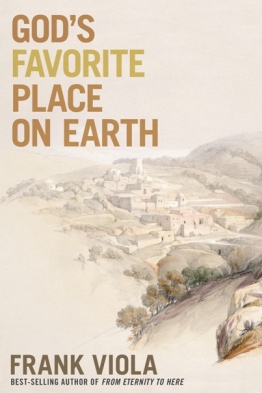We run our website the way we wished the whole internet worked: we provide high quality original content with no ads. We are funded solely by your direct support. Please consider supporting this project.

Interview with Frank Viola on his Book “God’s Favorite Place on Earth”
Today is the release date for Frank Viola’s new book, God’s Favorite Place on Earth. Greg did an interview with Frank recently, and in celebration of his book release, we’re sharing that interview here. If you read to the end you’ll see how you can get 25 free gifts if you purchase the book from May 1st (today) through May 7th! And they’re really great gifts too! Hope you enjoy the interview…
~~~
Greg: I was initially struck by the title of your newest book, “God’s Favorite Place on Earth.” As one who loathes the idolatrous nationalism that has often led American Christians as well as others to claim that “WE are God’s favored nation,” I was delighted (though not surprised) to discover that the title of your book has nothing to do with THAT. But can you let us in on what is behind this title?
Frank: Sure. The title of my book is fitting because it seeks to bring out a story in the Gospels that’s rarely navigated. That story is one in which the Creator of the Universe, incarnate in Jesus of Nazareth, was rejected in every quarter in which He stepped . . . from the womb to the tomb.
He was rejected from Bethlehem (there was no room for Him there), to Nazareth (a prophet is without honor in His own hometown), to His own family (His sisters and brothers didn’t believe on Him), to Samaria (James and John wanted the city to shake and bake for rejecting Jesus), to Jerusalem itself (which crucified Him). God in flesh was rejected everywhere He went.
The Gospels are clear about this: “He came to His own and His own received Him not” . . . “Foxes have holes and birds have nests, but the Son of Man has nowhere to lay His head.”
BUT . . . there was only one place on earth where Jesus was fully received, fully welcomed, and fully loved. It was a little village 2 miles east of Jerusalem called Bethany. Jesus spent the last week of His life on earth there. It was home for Him.
In the book, I trace the Lord’s steps in Bethany in chronological order and show that what God is looking for above anything else today is a “Bethany” in every heart, in every city, and in every church.
Greg: I’m told there are approximately 3 million books that will be published in 2013. What is it that you believe makes “God’s Favorite Place on Earth” stand out? Why should someone want to take the time to read this book? And what are the “felt needs” that your book addresses?
Frank: The book addresses 18 specific struggles that Christians face. And it was born out of my own struggles in these areas as well as those of my fellow brethren and sistren.
Some of those struggles are:
- how to gain God’s peace and presence in the midst of your worst storm.
- how to grow to the place where you are beyond being offended.
- how to truly forgive and release those who have rejected you.
- how to live life without fear of anything.
- how to handle rejection, misunderstanding, and unjust criticism, especially from fellow Christians.
- how to defeat consumerism and escape the grip of materialism.
The book is written in an accessible way. It uses short sentences (thanks Hemingway) and combines fiction with non-fiction. Yet it stays very close to the biblical text and is faithful to first-century history. So we call it “biblical narrative.” Readers can see one of the sections where Lazarus speaks about one of the most moving parts of the Gospels. See Anointed for Burial.
Greg: You’re a remarkably prolific writer Frank. Can you tell those of us who have read some or maybe even all of your previous books how this book differs from the others?
Frank: I laughed at your comment because, to my mind, you’re the one who is “remarkably prolific.” Maybe you’re projecting that onto me, bro. ;-)
The book is similar in that it seeks to extol the supremacy, centrality, and all-sufficiency of Jesus Christ. It also contains a bit of the sublime elements of our faith – which I owe to many of God’s servants who have taught me over the years.
It’s different in that it’s super easy to read. It’s short. And it contains the element of fiction. Lazarus, now old and ready to die, tells the story of when Jesus came to His hometown and the incredible things that took place there.
I also think the book is more emotional than most of my others. Several people told me that they wept while reading it. And I lost it myself when I wrote the part where Lazarus describes his own death.
Greg: One of the things I found most intriguing about “God’s Favorite Place on Earth” was the very creative way you blend historical analysis, biblical teaching and fictional narrative. Can you give our readers some insight into why you chose this unique approach to your subject? What would you say is the central narrative you’re communicating throughout this book?
Frank: What I’m trying to get across is how much Jesus loved Bethany and the family who lived there. And why He loved them so much. The Gospels make a big deal out of this and we miss it because the story is spread all over Matthew, Mark, Luke and John – out of chronological order.
I juice the whole Christian pursuit down to one thing: God wants a Bethany on the earth again … in every one of us. And in every church. This narrative and vision simplifies things, yet it’s so rich and full of life.
Because the message in the book changed my life on so many levels, I wrote it with the hopes that the Holy Spirit would use it to change the lives of others.
Greg: Most of the people who are regulars on the ReKnew website are passionate in their conviction that God is as beautiful as He is revealed to be in Jesus Christ and that evil originates in wills other than God, whether human or angelic. Your book has some interesting things to say about God and suffering, so I’m wondering if you’d share with our readers your understanding of free will, the origin of evil, and the manner in which God works to bring good out of evil? For example, would you agree with those who hold that evil events like the Holocaust come about because they are part of God’s “perfect plan”?
Frank: I used to know the answer to that question. ;-)
That subject is way above my pay grade. But I think I might understand a few things about it, nonetheless:
1) When bad things happen in our lives, we want an explanation, but God wants to give us a revelation of His Son. Every crisis is an unwanted opportunity for us to discover a new and fresh aspect of Jesus Christ. So I’ve learned, anyway.
2) I disagree with the statement that tragedies like the Holocaust are God’s “perfect plan or will.” God is both wise and compassionate beyond our comprehension. He knows how to write straight with crooked lines and He’s the ultimate Chess Master, using the moves of His enemy against them. It’s rather incredible how He does this. But He is Love, not evil.
3) Many of our sufferings are a participation in the sufferings of Christ Himself. There is something that Paul calls ”the fellowship of His sufferings” which is the gateway to the “power of His resurrection.” This has been a game-changer for me (Philippians 3).
4) God comforts us in our suffering. He suffers with us. And He uses our sufferings – even when they originate from fallen beings – for our good, often to break us and beautify us into His image (Romans 8:28ff.)
All of these points and more are elaborated in the book.
Greg: What have early readers of “God’s Favorite Place” said about it? What’s their reaction been?
Frank: I’ve been humbled and overjoyed by the responses. 47 Christian leaders have recommended the book, including you – which I was so honored by. Each leader shared exactly how the book touched their hearts. I hope most of the people who read the book will have the same experience.
Greg: Word on the street is that everyone who buys the book this week, May 1st to May 7th, will receive 25 free gifts! That’s a lot of free stuff you’re giving away! Tell us about these gifts and how can people can get ahold of them?
Frank: Huggy Bear is correct about that. ;-) Do your readers even know who Huggy Bear is? He held a PhD in “word on the street.”
Anywho, yes. As you know, the release week of a book is the most important time in any book’s life. If a lot of people order the book during release week, it means the book will be noticed and made visible to tons of people who wouldn’t hear about it otherwise.
If not, well, it just gets lost in the sauce of the deafening noise we face each day on the Internet. (Which includes 3 million book published each year.)
So I wanted to reward those who get the book this week by giving them 25 free – but valuable – books by 15 different authors. Your readers can click here for the details, including a book sampler, and video trailer: http://GodsFavoritePlace.com
Greg: Thanks for agreeing to the Interview Frank. We at ReKnew bless you and your ministry and pray that God uses this book to inspire people to make their lives, and their kingdom communities, “God’s favorite place on earth.”
I’m honored, bro. Really honored. The thanks goes to you for having me on.
Category: General
Tags: Frank Viola, Interview, Jesus
Related Reading

The Only Thing That Matters Is Love: The Kingdom of God (Part 3)
To say that living in Calvary-quality love is the most important thing in our life is to grossly understate its importance. This stands in distinction from how we typically define the Kingdom of God. But it stands in line with the fact that Jesus is the Kingdom of God. Paul says the “the only thing…

Why Bart Ehrman Doesn’t Have to Ruin Your Christmas (Or Your Faith) Part 2
This is the second of several videos Greg put together to refute Bart Ehrman’s claims published in the article What Do We Really Know About Jesus? If you missed it, you can catch the first installment here.

Making Resolutions? Consider This!
So, this is the time of year when we all look back at the year that is passing and look ahead to the new year in front of us. If you’re considering a New Year’s resolution, we wanted to make a tiny suggestion for your consideration. Greg has been fleshing out the ReKnew Manifesto in his…

The One True Image of God: God’s Self-Portrait, Part 4
This point is emphasized throughout the New Testament because, if we don’t get this, we are left to our own imaginations about God, and we’ll draw from a multitude of different sources to construct a mental picture of God that will, to one degree or another, fall short of the beauty of the true God…
